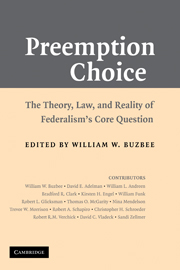Book contents
- Frontmatter
- Contents
- Contributors
- Acknowledgments
- Introduction
- Part I FEDERALISM THEORY, HISTORY, AND PREEMPTION VARIABLES
- Part II THE LAYERED GOVERNMENT NORM
- Part III JUDICIAL TREATMENT AND INTERPRETIVE CHOICE
- Part IV PREEMPTION TALES FROM THE FIELD
- 11 The Regulation–Common Law Feedback Loop in Nonpreemptive Regimes
- 12 Delegated Federalism Versus Devolution: Some Insights from the History of Water Pollution Control
- 13 Adaptive Environmental Federalism
- Conclusion: The Menu of Preemption Choice Variables
- Index
12 - Delegated Federalism Versus Devolution: Some Insights from the History of Water Pollution Control
Published online by Cambridge University Press: 07 July 2009
- Frontmatter
- Contents
- Contributors
- Acknowledgments
- Introduction
- Part I FEDERALISM THEORY, HISTORY, AND PREEMPTION VARIABLES
- Part II THE LAYERED GOVERNMENT NORM
- Part III JUDICIAL TREATMENT AND INTERPRETIVE CHOICE
- Part IV PREEMPTION TALES FROM THE FIELD
- 11 The Regulation–Common Law Feedback Loop in Nonpreemptive Regimes
- 12 Delegated Federalism Versus Devolution: Some Insights from the History of Water Pollution Control
- 13 Adaptive Environmental Federalism
- Conclusion: The Menu of Preemption Choice Variables
- Index
Summary
This chapter examines the claim that state and local governments were beginning, prior to the enactment of the Clean Water Act in 1972, to make significant progress in the fight against water pollution. Based on this premise, some have argued that there is good reason to be skeptical about the necessity for continued federal involvement in water pollution control. At their broadest, such scholars use this revisionist history to question other federal environmental statutes' structures as well. The implication of this argument is that the devolution of regulatory authority to the states would not produce lower levels of environmental protection. Thus our present approach to water pollution control – delegated program federalism, a form of cooperative federalism with federal regulatory floors preempting any more lax state regulation, and federal oversight of state delegated programs – is really not necessary from a practical point of view and can be discarded without producing substantial environmental harm.
After setting forth the Clean Water Act's approach to delegated federalism, the chapter discusses the flawed nature of the data on which this claim is made. The experience of the 1960s simply does not support the argument in favor of devolution. This does not mean that every state was retrograde in its protection of water quality. The chapter, therefore, will also look at the progressive approach taken by some states, while also focusing on the action of the federal government during the 1960s to improve water quality.
- Type
- Chapter
- Information
- Preemption ChoiceThe Theory, Law, and Reality of Federalism's Core Question, pp. 257 - 276Publisher: Cambridge University PressPrint publication year: 2008

